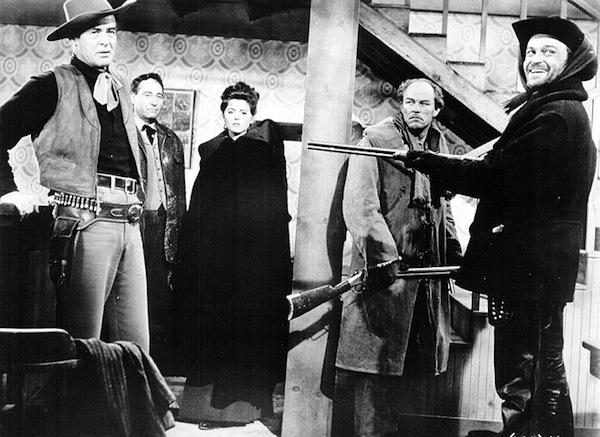As a director of Westerns in the 1950s, André de Toth is seldom spoken of in the same breath as Budd Boetticher and Anthony Mann, but there’s a case to be made that he was their equal. Day of the Outlaw (1959), de Toth's ice-cold farewell to the genre, matches Mann’s James Stewart Westerns in its harnessing of landscape to psychological dynamics, while its story of a hardened loner who won’t be shaken from his mission recalls Boetticher’s Randolph Scott films.
Constantly in dialogue with Shane (1953), it’s a redemption drama, set in a snow-shrouded Wyoming settlement called Bitters at the end of the trail. The formidable Robert Ryan is initially at his most curdled as Blaise Starrett, a selfish cattleman and protector of the open range, thus the polar opposite of Van Heflin’s community-minded Joe Starrett in George Stevens’s classic. Like Shane’s Ryker, Blaise resents homesteaders uncoiling their barbed wire in a valley he spent years making safe. He intends to kill one of them (Alan Marshal) – not least because he had an affair with the man’s grave but breathy wife (the excellent Tina Louise) and wants her back. Thwarted female desire courses through this town of twenty where men outnumber women five to one.
Blaise starts to reconsider his greed and lust when he sees it manifested among the six bank robbers who, pursued by the US cavalry, ride in under the iron control of a mortally wounded former army captain, Jack Brune (Burl Ives), and take the locals hostage. De Toth builds on Philip Yordan’s lean script by adding a tense scene in which the thugs with rape on their minds fling the women round a dance floor. Blaise contrives a way of getting the gang out of town before Brune’s imminent death unleashes his boys' craziness. The ensuing trek in the mountains, evocatively photographed by the great Russell Harlan, reveals that Blaise has renounced violence. Brune, also anxious to atone for his bloody past, shows he's capable of compassion for his youngest recruit.
Eureka’s Masters of Cinema release is dual format. Supplements include a video essay on the film by director and Western scholar Bertrand Tavernier and a printed essay by de Toth on the difficulties of making the under-budgeted film in the Oregon wilds.















Add comment